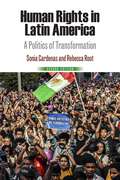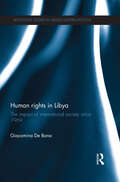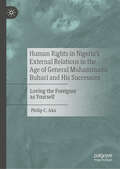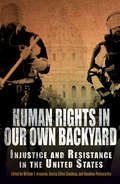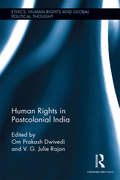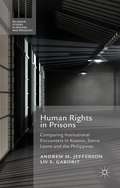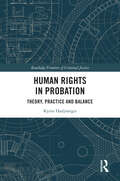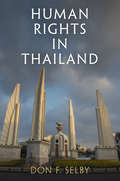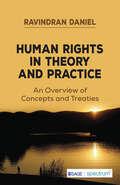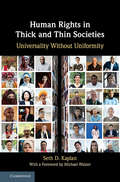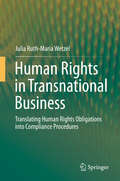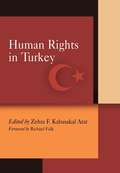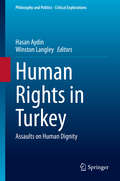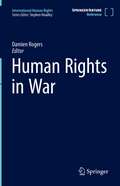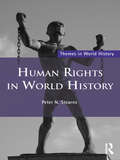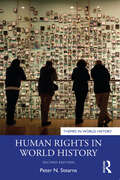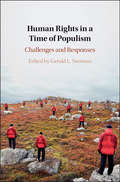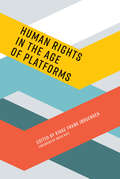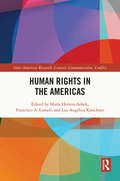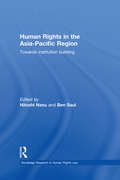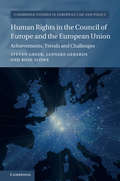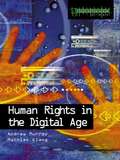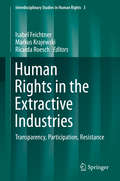- Table View
- List View
Human Rights in Latin America: A Politics of Transformation (Pennsylvania Studies in Human Rights)
by Sonia Cardenas Rebecca K. RootFor decades, Latin America has been plagued by civil wars, dictatorships, torture, legacies of colonialism, racism, and inequality. The region has also experienced dramatic—if uneven—human rights improvements, shedding light on the politics of transformation. The accounts of how Latin America’s people have dealt with the persistent threats to their fundamental rights offer lessons for people around the world.Human Rights in Latin America provides a comprehensive introduction to the human rights issues facing an area that constitutes more than half of the Western Hemisphere. This second edition brings together regional case studies and thematic chapters to explore cutting-edge issues and developments in the field. From historical accounts of abuse to successful transnational campaigns and legal battles, Human Rights in Latin America explores the dynamics underlying a vast range of human rights initiatives. In addition to surveying the roles of the United States, relatives of the disappeared, and truth commissions, Sonia Cardenas and Rebecca Root cover newer ground in addressing the colonial and ideological underpinnings of human rights abuses, emerging campaigns for gender and sexuality rights, and regional dynamics relating to the International Criminal Court.Engagingly written and fully illustrated, Human Rights in Latin America fills an important niche among human rights and Latin American textbooks. Ample supplementary resources—including discussion questions, interdisciplinary reading lists, filmographies, online resources, internship opportunities, and instructor assignments—make this an especially valuable text for use in human rights courses.
Human Rights in Libya: The Impact of International Society Since 1969 (Routledge Studies in Middle Eastern Politics)
by Giacomina De BonaSince the end of the Cold War a democratic wave has swept through large parts of the world, propagating liberal values and giving impetus to the case for human rights in an international society. To date however, the promotion of human rights has presented a mixed account with some countries lagging behind others in terms of their observance. In an effort to account for these differences, this book analyzes the relationship between norms and the social construction of international society, and examines how human rights are promoted in that context. Focussing on Libya as a case study, Giacomina De Bona criticises the neo-realist approach by demonstrating the impact of international society on the advancement of human rights. Libya has related to the international environment in different ways over time, ranging from isolation to reconciliation and regime change, making it a particularly interesting example. This book is of particular relevance in light of the recent Arab Spring and raises the question as to whether the coercive imposition of the Western liberal model contributes to establishing respect for human rights in what continue to be the peripheral zones of international society.
Human Rights in Nigeria's External Relations in the Age of General Muhammadu Buhari and His Successors: Loving the Foreigner as Yourself
by Philip C. AkaUnder the Fourth Republic since 1999, the challenge Nigerian leaders face like never before is how to create a state that matches the expectations of their diverse peoples at home and abroad. Taking this proposition as starting point, this book advances proposals for a human-right policy, referred to alternately in the work as principled foreign policy, for Nigeria under the Fourth Republic, taking advantage of the inestimable opportunity afforded by General Muhammadu Buhari’s departure from the political scene on May 29, 2023, after the famine, domestically and externally, wrought by his two terms of office as President. It is a broad-ranging argument, draped in the less arcane constitutional vocabulary and material of human rights, for thoroughgoing reforms at home and abroad as the only antidote to the nation-building dilemmas Nigeria confronts in the first quarter of the twenty-first century. Buhari’s departure marks the end of military teleguidance of Nigerian politics under the Fourth Republic in the camouflage of democratic rule, a birthmark of remote control dating back to the first military intervention in the country in January 1966. These momentous events within Nigeria coincide with equally epoch-making developments in the UK, Nigeria’s former colonial overlord, with ripple effects in Nigeria, signified by the death of Queen Elizabeth II, after seven decades on the throne, and the emergence of Prince Charles as King of England. A new monarch in Britain adds to the opportunity that falls open for the reconfiguration of Nigeria’s external relations with ramifications for the application of human rights in those relations. Despite its known disabilities, Nigeria has the potential infrastructure, including its sizable population, to conduct a human-right policy, if its leaders rationalize the country’s resources more wisely.
Human Rights in Our Own Backyard
by Bandana Purkayastha William T. Armaline Davita Silfen GlasbergMost Americans assume that the United States provides a gold standard for human rights--a 2007 survey found that 80 percent of U.S. adults believed that "the U.S. does a better job than most countries when it comes to protecting human rights." As well, discussions among scholars and public officials in the United States frame human rights issues as concerning people, policies, or practices "over there." By contrast, the contributors to this volume argue that many of the greatest immediate and structural threats to human rights, and some of the most significant efforts to realize human rights in practice, can be found in our own backyard.Human Rights in Our Own Backyard examines the state of human rights and responses to human rights issues, drawing on sociological literature and perspectives to interrogate assumptions of American exceptionalism. How do people in the U.S. address human rights issues? What strategies have they adopted, and how successful have these strategies been? Essays are organized around key conventions of human rights, focusing on the relationships between human rights and justice, the state and the individual, civil rights and human rights, and group rights versus individual rights. The contributors are united by a common conception of the human rights enterprise as a process involving not only state-defined and implemented rights but also human rights from below as promoted by activists.
Human Rights in Postcolonial India (Ethics, Human Rights and Global Political Thought)
by Om Prakash Dwivedi V. G. RajanThis volume looks at human rights in independent India through frameworks comparable to those in other postcolonial nations in the Global South. It examines wide-ranging issues that require immediate attention such as those related to disability, violence, torture, education, LGBT, neoliberalism, and social justice. The essays presented here explore the discourse surrounding human rights, and engage with aspects linked to the functioning of democracy, security and strategic matters, and terrorism, especially post 9/11. They also discuss cases connected with human rights violations in India and underline the need for a transparent approach and a more comprehensive perspective of India’s human rights record. Part of the series Ethics, Human Rights and Global Political Thought, the volume will be an important resource for academics, policy makers, civil society organisations, lawyers and those concerned with human rights. It will also be useful to scholars and researchers of Indian politics, law and sociology.
Human Rights in Prisons
by Andrew M. Jefferson Liv S. GaboritLike many prisons around the world, those in Sierra Leone, Kosovo and the Philippines are subject to the scrutiny and intervention of rights-based non-governmental organisations. This book compares encounters between prisons and NGOs drawing particular attention to the variation in styles of intervention. It ultimately shows how prisons act on NGOs as much as NGOs act on prisons. The authors call for a re-alignment of rights-based approaches to prison reform more finely and pragmatically attuned to the reality of interdependent relations between prisons and NGOs. Human Rights in Prisons advances understandings of institutional agency by casting a much needed empirical light on prisons, relations between staff and prisoners, and the inexorable grind of prison life.
Human Rights in Probation: Theory, Practice and Balance (Routledge Frontiers of Criminal Justice)
by Kyros HadjisergisExploring the application, theory, implications and socio-legal underpinnings of human rights in probation and associated offender management, this book examines the organisation and re-organization of the National Probation Service, from the introduction of the Human Rights Act (HRA) to the end of the Transforming Rehabilitation era.Outlining how the duties of probation officers are interpreted in light of the HRA, this book evaluates applicable case law as a means to exemplify and clarify the direct operation of human rights law in instances of potential human rights violations. Chapters also analyse the current and future infrastructure of probation to demonstrate challenges of awareness, implementation and compliance. Based on qualitative data analysed through a socio-legal lens and a human rights framework, themes explored include crime control and due process, and are reflective of the tensions and imbalances experienced between risk or public protection and human rights. The book also includes case studies of Serious Further Offences that have either shed light on the shortcomings in the area of human rights in probation or highlighted factors linked to human rights, including scapegoating, cumulative systemic failures, miscommunications and over-reliance on risk assessments. Finally, it provides clarity as to what the human rights duties of the Service are, what relevant laws apply alongside the HRA, and how these decisions affect risk and offender management.An important and timely study of probation in England and Wales, Human Rights in Probation will be of great interest to academics of probation, criminal justice, and human rights. It will also be of value to Probation officers (including trainees) and other practitioners working in offender management services.
Human Rights in Thailand (Pennsylvania Studies in Human Rights)
by Don SelbyWhen the Thai state violently suppressed a massive prodemocracy protest in "Black May," 1992, it initiated an unprecedented period in Thailand. The military, shamed and chagrined, withdrew from political life, and the democracy movement had more latitude than ever before in Thailand's history, gaining an institutional presence previously unseen. This extraordinary moment created a unique opportunity for the human rights movement to emerge, for the first time, on a national scale in Thailand. <P><P>Don F. Selby examines this era of Thai political history to determine how and why the time was ripe for such developments. By placing greater emphasis on human rights as an anthropological concern, he focuses on the understandings that social actors draw from human rights struggles. He concludes that what gave emergent human rights in Thailand their shape, force, and trajectories are the ways that advocates engaged, contested, or reworked debates around Buddhism in its relationship to rule and social structure; political struggle in relation to a narrative of Thai democracy that disavowed egalitarian movements; and traditional standards of social stratification and face-saving practices. <P><P> In this way, human rights ideals in Thailand emerge less from global-local translation and more as a matter of negotiation within everyday forms of sociality, morality, and politics.
Human Rights in Theory and Practice: An Overview of Concepts and Treaties
by Ravindran DanielAppreciation of the context that advances or hinders the enjoyment of human rights would provide the basis for developing relevant strategies, including the use of concepts, laws and mechanisms to promote human rights protection. With this aim, this book facilitates reflection on the theory and practice of human rights. It deals with the historical evolution of human rights ideas, traces the evolution of international human rights law, examines the UN and other human rights protection mechanisms, discusses the growth of human rights NGOs and their contribution, and studies the changing contours of the human rights movement. Human Rights in Theory and Practice: An Overview of Concepts and Treaties includes detailed examination of the provisions of major human rights treaties. It is a revised and updated version of the 1998 publication, Human Rights Praxis: A Resource Book for Study, Action and Reflection, which was widely used by activists and other readers and was translated into Bahasa Indonesia, Thai and Tamil. The present book will similarly be of interest to human rights activists and scholars of politics, law, sociology, history, international relations and peace studies.
Human Rights in Thick and Thin Societies: Universality Without Uniformity
by Seth D. KaplanSocio-centric societies have vibrant - albeit different - concepts of human flourishing than is typical in the individualistic West. These concepts influence the promotion of human rights, both in domestic contexts with religious minorities and in international contexts where Western ideals may clash with local norms. Human Rights in Thick and Thin Societies uncovers the original intentions of the drafters of the Universal Declaration of Human Rights, finds inspiration from early leaders in the field like Eleanor Roosevelt, and examines the implications of recent advances in cultural psychology for understanding difference. The case studies included illustrate the need to vary the application of human rights in differing cultural environments, and the book suggests a new framework: a flexible universalism that returns to basics - focusing on the great evils of the human condition. This approach will help the human rights movement succeed in a multipolar era.
Human Rights in Transnational Business
by Julia Ruth-Maria WetzelThis book investigates how human rights lawcan be applied to corporate entities. To date there have been insufficientinternational legal mechanisms to bring corporations to justice for theirmisconduct abroad. The book argues that rather than trying to solve the problemlocally, an international approach to corporate human rights compliance needsto be sought to prevent future corporate human rights abuses. Implementing effective and enforceablehuman rights compliance policies at corporate level allows businesses toprevent negative human rights impacts such as loss of revenue, high litigationcosts and damage to reputation. By considering human rights to be aninherent part of their business strategy, corporations will be well equipped tomeet national and regional business and human rights standards, which willinevitably be implemented in the next few years. This approach, in turn, also furthers thefundamental aim of international human rights law.
Human Rights in Turkey (Pennsylvania Studies in Human Rights)
by Zehra F. Kabasakal AratTurkey's mixed human rights record has been highly politicized in the debate surrounding the country's probable ascendance to membership in the European Union. Beginning with the foundation of a secular republic in 1923, and continuing with founding membership in the United Nations and participation in the European Convention on Human Rights and Fundamental Freedoms, Turkey made significant commitments to the advancement of human rights. However, its authoritarian tradition, periods of military rule, increasing social inequality, and economic crises have led to policies that undermine human rights. While legislative reforms and civil social activism since the 1980s have contributed greatly to the advancement of human rights, recent progress is threatened by the rise of nationalism, persistent gender inequality, and economic hardship.In Human Rights in Turkey, twenty-one Turkish and international scholars from various disciplines examine human rights policies and conditions since the 1920s, at the intersection of domestic and international politics, as they relate to all spheres of life in Turkey. A wide range of rights, such as freedom of the press and religion, minority, women's, and workers' rights, and the right to education, are examined in the context of the history and current conditions of the Republic of Turkey.In light of the events of September 11, 2001, and subsequent developments in the Middle East, recent proposals about modeling other Muslim countries after Turkey add urgency to an in-depth study of Turkish politics and the causal links with human rights. The scholarship presented in Human Rights in Turkey holds significant implications for the study of human rights in the Middle East and around the globe.
Human Rights in Turkey: Assaults on Human Dignity (Philosophy and Politics - Critical Explorations #15)
by Winston Langley Hasan AydinThe book provides the historical setting of Turkey related to the development of democracy, human rights issues, the treatment of cultural and ethnic minorities, and the short- and long-term consequences of the crackdown including impacts on individuals, institutions like education and the media, the criminal justice system, the economy, and Turkey’s standing in the international community. Since the foundation of the Republic of Turkey, the military and the media have been the main traditional powers of oppressive, secularist, and nationalist regimes in the country. After a period of initial reforms, rather than eliminating the structures of the authoritarian state, Recep Tayyip Erdoğan seized the levers of power and used them aggressively against his political enemies. He turned Turkey into a one-man regime after the failed coup attempt on July 15, 2016, and his actions included the widespread violation of human rights.This book tells the tale of the consequences of the measures taken after the failed coup attempt that have adversely impacted the development of democracy and human rights in Turkey, altering the nation’s course of history. Beginning with a State of Emergency that was declared in July of 2016, Turkey has moved to a more authoritarian state. Among the consequences of the actions taken have been imprisonment of hundreds of thousands, the shuttering of media, the dismissal of public employees, the dismissal of academics, jailed elected Kurdish politicians, and the misuse of the criminal justice to victimize the population. Adverse effects have included widespread violations of human rights, torture, and mistreatment of prisoners, false imprisonment, and the absence of the right to a fair trial. This book examines some of the thorniest questions of Turkish democratization and human rights, including the underlying reasons for the decay of democracy and what has happened as a result of this decay. Among these is a deterioration of the educational system, a reduction in economic stability, the absence of the rule of law and due process, a radical transformation of the country, and violations of universal human rights.Endorsements:As one who knows people who have been victimized by the authoritarian regime in Turkey, “Human Rights in Turkey” provides unique insights and perspectives on the changes that have befallen his wonderful country. It is truly insightful. David L. Carter, Ph.D., Michigan State UniversityHuman Rights in Turkey: Assaults on Human Dignity fills a major gap in contemporary political scholarship. Its elucidation of Turkey’s democratic backsliding into a one-man authoritarian regime is insightful and unique. Absolutely required reading for anyone who cares about this beautiful country, its wonderful people, and its uncertain future. Kati Piri, Member of the European Parliament and Delegation to the EU-Turkey Joint Parliamentary CommitteeAydin’s and Langley’s book addresses critical issues in a critical case. Turkey had been regarded as a rising democracy in a troubled region, but in recent years the country has experienced troubling signs of democratic erosion. Central to that decline is the precarious status of basic human rights of expression, association, religion, and due process. This book explores what has happened and how it affects individuals and the Turkish polity more broadly.John M. Carey, Ph.D.. Wentworth Professor in the Social Sciences, Dartmouth College, NH, USATurkey was once a poster-boy of the league of modernizing countries – a staunch ally of the West, an almost-democracy that would become better soon enough. It might even be the first Muslim country to join the European Union. That image now lies shattered under the erratic one-man-show of Tayyip Erdoğan. The police state reigns supreme, opposition is cowed, the courts are in shambles, and more journalists are jailed for their opinions than in any
Human Rights in War (International Human Rights)
by Damien RogersThis volume is the most comprehensive and up-to-date compilation of in-depth analyses on human rights violations committed in war. It offers myriad perspectives on the content and application of legal protections offered to civilians, including women, children and the elderly, and to others who are ‘no longer active in the fight.’ A series of carefully researched case studies illustrates the extent to which human rights violations occur in recent and current armed conflict, and signals the ways in which these violations are dealt with. Each of the contributing authors has been selected on the basis of their international academic reputation and/or professional standing within the human rights field. Given the alarming numbers of people harmed in recent and current armed conflict, this book will be of great interest to researchers, policymakers and opinion-shapers alike.
Human Rights in World History (Themes in World History)
by Peter N. StearnsDefended by a host of passionate advocates and organizations, certain standard human rights have come to represent a quintessential component of global citizenship. There are, however, a number of societies who dissent from this orthodoxy, either in general or on particular issues, on the basis of political necessity, cultural tradition, or group interest. Human Rights in World History takes a global historical perspective to examine the emergence of this dilemma and its constituent concepts. Beginning with premodern features compatible with a human rights approach, including religious doctrines and natural rights ideas, it goes on to describe the rise of the first modern-style human rights statements, associated with the Enlightenment and contemporary antislavery and revolutionary fervor. Along the way, it explores ongoing contrasts in the liberal approach, between sincere commitments to human rights and a recurrent sense that certain types of people had to be denied common rights because of their perceived backwardness and need to be "civilized". These contrasts find clear echo in later years with the contradictions between the pursuit of human rights goals and the spread of Western imperialism. By the second half of the 20th century, human rights frameworks had become absorbed into key global institutions and conventions, and their arguments had expanded to embrace multiple new causes. In today’s postcolonial world, and with the rise of more powerful regional governments, the tension between universal human rights arguments and local opposition or backlash is more clearly delineated than ever but no closer to satisfactory resolution.
Human Rights in World History (Themes in World History)
by Peter N. StearnsThis book takes a global historical perspective to trace the rise of human rights and their global impact from the 18th century to the present. This fully updated volume examines the complex relationships between Western concepts of human rights and developments in other world regions. After providing background on relevant premodern concepts and constraints, the book explores regional interactions with human rights, the disastrous impact of imperialism and racism, the recurrent expansion of the range of rights given to those including women and children, and indigenous rights from the 19th century to the present. Major revisions for the second edition include: • a new chapter focusing on recent historical and interdisciplinary debates • a separate chapter on developments between the world wars • greater attention to causation and an expanded treatment of some regions, including Africa • an analysis of the mix of setbacks and rights expansion during the past 15 years, within the global framework. Human Rights in World History is essential reading for students, scholars, and researchers interested in modern history, human rights, and political science.
Human Rights in a Time of Populism: Challenges and Responses
by Gerald L. NeumanThe electoral successes of right-wing populists since 2016 have unsettled world politics. The spread of populism poses dangers for human rights within each country, and also threatens the international system for protecting human rights. Human Rights in a Time of Populism examines causes, consequences, and responses to populism in a global context from a human rights perspective. It combines legal analysis with insights from political science, international relations, and political philosophy. Authors make practical recommendations on how the human rights challenges caused by populism should be confronted. This book, with its global scope, international human rights framing, and inclusion of leading experts, will be of great interest to human rights lawyers, political scientists, international relations scholars, actors in the human rights system, and general readers concerned by recent developments.
Human Rights in the Age of Platforms (Information Policy)
by Rikke Frank JørgensenScholars from across law and internet and media studies examine the human rights implications of today's platform society.Today such companies as Apple, Facebook, Google, Microsoft, and Twitter play an increasingly important role in how users form and express opinions, encounter information, debate, disagree, mobilize, and maintain their privacy. What are the human rights implications of an online domain managed by privately owned platforms? According to the Guiding Principles on Business and Human Rights, adopted by the UN Human Right Council in 2011, businesses have a responsibility to respect human rights and to carry out human rights due diligence. But this goal is dependent on the willingness of states to encode such norms into business regulations and of companies to comply. In this volume, contributors from across law and internet and media studies examine the state of human rights in today's platform society.The contributors consider the “datafication” of society, including the economic model of data extraction and the conceptualization of privacy. They examine online advertising, content moderation, corporate storytelling around human rights, and other platform practices. Finally, they discuss the relationship between human rights law and private actors, addressing such issues as private companies' human rights responsibilities and content regulation.ContributorsAnja Bechmann, Fernando Bermejo, Agnès Callamard, Mikkel Flyverbom, Rikke Frank Jørgensen, Molly K. Land, Tarlach McGonagle, Jens-Erik Mai, Joris van Hoboken, Glen Whelan, Jillian C. York, Shoshana Zuboff, Ethan ZuckermanOpen access edition published with generous support from Knowledge Unlatched and the Danish Council for Independent Research.
Human Rights in the Americas (InterAmerican Research: Contact, Communication, Conflict)
by Francisco A. Lomelí María Herrera-Sobek Luz Angélica KirschnerThis interdisciplinary book explores human rights in the Americas from multiple perspectives and fields. Taking 1492 as a point of departure, the text explores Eurocentric historiographies of human rights and offer a more complete understanding of the genealogy of the human rights discourse and its many manifestations in the Americas. The essays use a variety of approaches to reveal the larger contexts from which they emerge, providing a cross-sectional view of subjects, countries, methodologies and foci explicitly dedicated toward understanding historical factors and circumstances that have shaped human rights nationally and internationally within the Americas. The chapters explore diverse cultural, philosophical, political and literary expressions where human rights discourses circulate across the continent taking into consideration issues such as race, class, gender, genealogy and nationality. While acknowledging the ongoing centrality of the nation, the volume promotes a shift in the study of the Americas as a dynamic transnational space of conflict, domination, resistance, negotiation, complicity, accommodation, dialogue, and solidarity where individuals, nations, peoples, institutions, and intellectual and political movements share struggles, experiences, and imaginaries. It will be of interest to all scholars and students of InterAmerican studies and those from all disciplines interested in Human Rights.
Human Rights in the Asia-Pacific Region: Towards Institution Building (Routledge Research in Human Rights Law)
by Hitoshi Nasu Ben SaulThe Asia-Pacific is known for having the least developed regional mechanisms for protecting human rights. This edited collection makes a timely and distinctive contribution to contemporary debates about building institutions for human rights protection in the Asia-Pacific region, in the wake of ASEAN’s establishment in 2009 of a sub-regional human rights commission. Drawing together leading scholarly voices, the book focuses on the systemic issue of institutionalising human rights protection in the Asia-Pacific. It critically examines the prospects for deepening and widening human rights institutions in the region, challenging the orthodox scepticism about whether the Asia-Pacific is "ready" for stronger human rights institutions and exploring the variety of possible forms that regional and sub-regional institutions might take. The volume also analyses the impediments to new institutions, whilst questioning the justifications for them. The collection provides a range of perspectives on the issues and many of the chapters bring interdisciplinary insights to bear. As such, the collection will be of interest to scholarly, practitioner, and student audiences in law, as well as to readers in international relations, political science, Asian studies, and human rights.
Human Rights in the Constitutional Law of the United States
by Michael J. PerryIn the period since the end of the Second World War, there has emerged what never before existed: a truly global morality. Some of that morality - the morality of human rights - has become entrenched in the constitutional law of the United States. This book explicates the morality of human rights and elaborates three internationally recognized human rights that are embedded in U. S. constitutional law: the right not to be subjected to cruel, inhuman, or degrading punishment; the right to moral equality; and the right to religious and moral freedom. The implications of one or more of these rights for three great constitutional controversies - capital punishment, same-sex marriage, and abortion - are discussed in-depth. Along the way, Michael J. Perry addresses the question of the proper role of the Supreme Court of the United States in adjudicating these controversies.
Human Rights in the Council of Europe and the European Union: Achievements, Trends and Challenges (Cambridge Studies In European Law And Policy )
by Janneke Gerards Steven Greer Rose SloweConfusion about the differences between the Council of Europe (the parent body of the European Court of Human Rights) and the European Union is commonplace amongst the general public. It even affects some lawyers, jurists, social scientists and students. This book will enable the reader to distinguish clearly between those human rights norms which originate in the Council of Europe and those which derive from the EU, vital for anyone interested in human rights in Europe and in the UK as it prepares to leave the EU. The main achievements of relevant institutions include securing minimum standards across the continent as they deal with increasing expansion, complexity, multidimensionality and interpenetration of their human rights activities. The authors also identify the central challenges, particularly for the UK in the post-Brexit era where the components of each system need to be carefully distinguished and disentangled.
Human Rights in the Digital Age
by Andrew Murray Mathias KlangThe digital age began in 1939 with the construction of the first digital computer. In the sixty-five years that have followed, the influence of digitisation on our everyday lives has grown steadily and today digital technology has a greater influence on our lives than at any time since its development. This book examines the role played by digital technology in both the exercise and suppression of human rights. The global digital environment has allowed us to reinterpret the concept of universal human rights. Discourse on human rights need no longer be limited by national or cultural boundaries and individuals have the ability to create new forms in which to exercise their rights or even to bypass national limitations to rights. The defence of such rights is meanwhile under constant assault by the newfound ability of states to both suppress and control individual rights through the application of these same digital technologies. This book gathers together an international group of experts working within this rapidly developing area of law and technology and focuses their attantion on the specific interaction between human rights and digital technology. This is the first work to explore the challenges brought about by digital technology to fundamental freedoms such as privacy, freedom of expression, access, assembly and dignity. It is essential reading for anyone who fears digital technology will lead to the 'Big Brother' state.
Human Rights in the Extractive Industries: Transparency, Participation, Resistance (Interdisciplinary Studies in Human Rights #3)
by Isabel Feichtner Markus Krajewski Ricarda RoeschThis book addresses key challenges and conflicts arising in extractive industries (mining, oil drilling) concerning the human rights of workers, their families, local communities and other stakeholders. Further, it analyses various instruments that have sought to mitigate human rights violations by defining transparency-related obligations and participation rights. These include the Extractive Industries Transparency Initiative (EITI), disclosure requirements, and free, prior and informed consent (FPIC). The book critically assesses these instruments, demonstrating that, in some cases, they produce unwanted effects. Furthermore, it highlights the importance of resistance to extractive industry projects as a response to human rights violations, and discusses how transparency, participation and resistance are interconnected.
Human Rights in the Maya Region: Global Politics, Cultural Contentions, and Moral Engagements
by Pedro Pitarch Shannon Speed Xochitl Leyva SolanoIn recent years Latin American indigenous groups have regularly deployed the discourse of human rights to legitimate their positions and pursue their goals. Perhaps nowhere is this more evident than in the Maya region of Chiapas and Guatemala, where in the last two decades indigenous social movements have been engaged in ongoing negotiations with the state, and the presence of multinational actors has brought human rights to increased prominence. In this volume, scholars and activists examine the role of human rights in the ways that states relate to their populations, analyze conceptualizations and appropriations of human rights by Mayans in specific localities, and explore the relationship between the individualist and "universal" tenets of Western-derived concepts of human rights and various Mayan cultural understandings and political subjectivities. The collection includes a reflection on the effects of truth-finding and documenting particular human rights abuses, a look at how Catholic social teaching validates the human rights claims advanced by indigenous members of a diocese in Chiapas, and several analyses of the limitations of human rights frameworks. A Mayan intellectual seeks to bring Mayan culture into dialogue with western feminist notions of women's rights, while another contributor critiques the translation of the United Nations Declaration of Human Rights into Tzeltal, an indigenous language in Chiapas. Taken together, the essays reveal a broad array of rights-related practices and interpretations among the Mayan population, demonstrating that global-local-state interactions are complex and diverse even within a geographically limited area. So too are the goals of indigenous groups, which vary from social reconstruction and healing following years of violence to the creation of an indigenous autonomy that challenges the tenets of neoliberalism. Contributors: Robert M. Carmack, Stener Ekern, Christine Kovic, Xochitl Leyva Solano, Julin Lpez Garca, Irma Otzoy, Pedro Pitarch, lvaro Reyes, Victoria Sanford, Rachel Sieder, Shannon Speed, Rodolfo Stavenhagen, David Stoll, Richard Ashby Wilson
